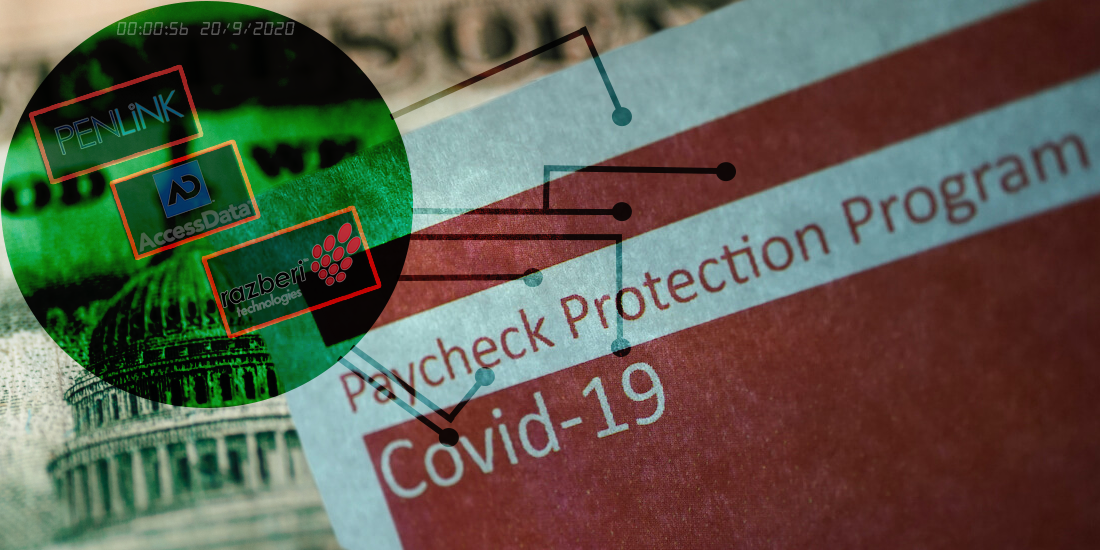Surveillance Technology Vendors Took Coronavirus Bailout Money Meant for Small Businesses
5 minute readFrom the editors: This is a sidebar to The Surveillance Architecture of Long Beach: Advanced Cameras.
The public’s first indication that the Small Business Administration’s Paycheck Protection Program forgivable loans were not being distributed as intended was when large, publicly-traded companies, such as JP Morgan Chase, Ruth’s Chris Steak House, and Shake Shack were able to obtain loans as large as $20 million—while true small businesses were unable to get funds before the various rounds of funding ran dry. Even the L.A. Lakers received a loan, while other businesses were left out. These forgivable loans from the federal government were publicly billed as a lifeline to small business, though the program was plagued by problems and a lack of transparency. Under enormous pressure, the Treasury Department eventually released the names of all businesses that received over $150,000 in funds.
Subsequent investigations by independent watchdog groups, Inspectors General, researchers, and the media have uncovered a wide range of companies that took undeserved funds, with over 450 companies returning funds. Due to the rushed nature of the PPP program, oversight took a backseat to rapid deployments. Investigations into companies that received undeserved funds are ongoing, with new companies discovered every week. The reasons companies should not have received PPP funds vary from having ready access to other sources of cash, not actually experiencing a COVID-19 related decline in business, not qualifying because holding active government contracts violates rules against double dipping, and not having qualifying employees on the payroll.
Just this week, a company Rudy Guiliani set up after his mayoral term ended was discovered to have received between $150,000 and $350,000 in PPP money, despite not having any employees on the payroll—with Guiliani claiming to be ignorant of the purpose of the company. To have been eligible for the PPP funds, Guiliani’s company, which reports having zero employees, would have needed between $720,000 to $1.68 million in payroll and employee benefits expenses.
As part of my examination of the LBPD’s surveillance technology vendors, I examined PPP records and found many of the LBPD’s vendors had received PPP funds. Additional investigation into the finances and government contracts of these companies calls into question the appropriateness of some of these awards.
As a practical matter, giving well-funded companies with extensive governmental contracts free money as a COVID-19 relief measure does not make a whole lot of fiscal sense. Is the free government money supposed to tide them over until the same government can afford to make more purchases?
The biggest LBPD vendor to receive PPP money is Pen-Link Ltd.—a company whose only acknowledged customers are local law enforcement, U.S. government agencies, and select foreign governments. They have landed over $182 million in Federal contracts since 2007. Besides their original technology to track cell phone usage, they sell newer technology that can intercept data such as call audio, email, text message content, or app data. They also offer an internet wiretap program called Predator.
Their total earnings from local law enforcement is unclear, but they have received $334,047 from the LBPD since 2014 and state that their product is used by over 7,000 agencies. That is a huge market share given there are only 17,985 local law enforcement agencies in the country. Their site even has a section to guide local law enforcement to federal grant programs. While small businesses are shuttering nation-wide after failing to obtain adequate PPP relief, we do not need to worry about Pen-Link Ltd., as they received $1 million to 2 million in PPP funds from the Small Business Administration.
Tomisin Oluwole
Face the Music, 2022
Acrylic on canvas
24 x 36 inches
Click here to check out our interview with Tomisin Oluwole, a literary and visual artist based in Long Beach.

Instead of gunking up our site with ads, we use this space to display and promote the work of local artists.
Other well-funded LBPD surveillance vendors also turned to PPP funds that were supposed to be reserved for small businesses without access to other sources of capital. Razberri Technology Inc—the technology provider for the $240,000 contract the City Council approved on May 1, 2018, for intelligent surveillance appliances to be installed by Platt Security—received $350,000 to $1 million in PPP funds. Razberri Technology seems to be able to raise money easily from outside investors with multiple rounds of recent funding, including $5.8 million in October 2019 and an undisclosed amount in April 2020 from Tech Coast Angels, one of the largest and most active angel investment organizations.
Another LBPD vendor to tap PPP funds is digital forensics company AccessData Group Inc, which has been paid $14,181 by the LBPD since 2015. They also do not appear to be the sort of company the Small Business Administration PPP program was designed for, with over $45 million in recent funding from Silicon Valley investors and venture capitalists, but they received $2 million to $5 million in PPP funds.
Another unexpected company that obtained PPP funds was social media surveillance company Babel Street—though the LBPD is not a Babel Street customer as they used Media Sonar and BrightPlanet for their social media monitoring needs. Babel Street and other social media monitoring companies are used to monitor mass gatherings for local police departments and can be used to assist in investigations. Babel Street’s most recent press coverage was an article in October about its partnership with another company to win a $500 million Department of Justice contract. A March 2020 article details its tens of millions in federal contracts for its newer product—Locate X, which can track individual users or act as a geofence to find all people who pass through a selected geographic area. In addition to its millions in active federal and local contracts, Babel Street received $2 to 5 million in PPP funds from the Small Business Administration.
Notably, $2 million is the Department of Treasury’s cut-off for returning undeserved PPP funds with no questions asked. Although how many questions the government will ask of the recipients that do not return the money or received over $2 million has yet to be revealed.
Greg Buhl is a Long Beach resident and attorney. He took up writing as a hobby during the COVID-19 lockdown and with more reasons than ever to not go outside he’s going to be tackling some ambitious writing projects.
Questions, comments, concerns, or tips can be directed to him at his relatively new twitter @legalshepherd or securely to GregBuhl@protonmail.com.
This work is licensed under a Creative Commons Attribution 3.0 Licence. Feel free to distribute, remix, adapt, or build upon this work.![]()


 legalshepherd562@gmail.com
legalshepherd562@gmail.com




